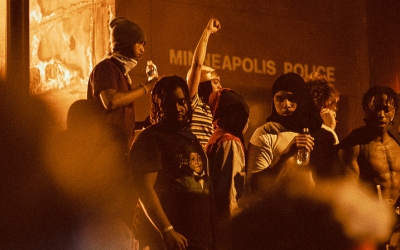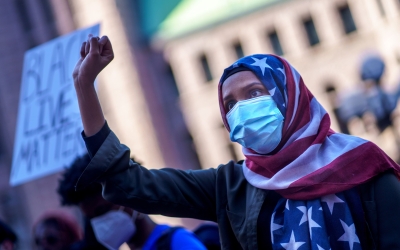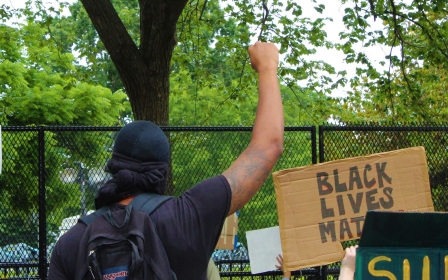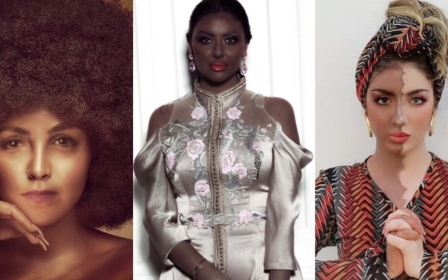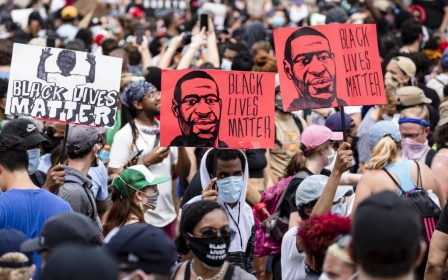Cameras didn't save George Floyd but could they save other Black lives?
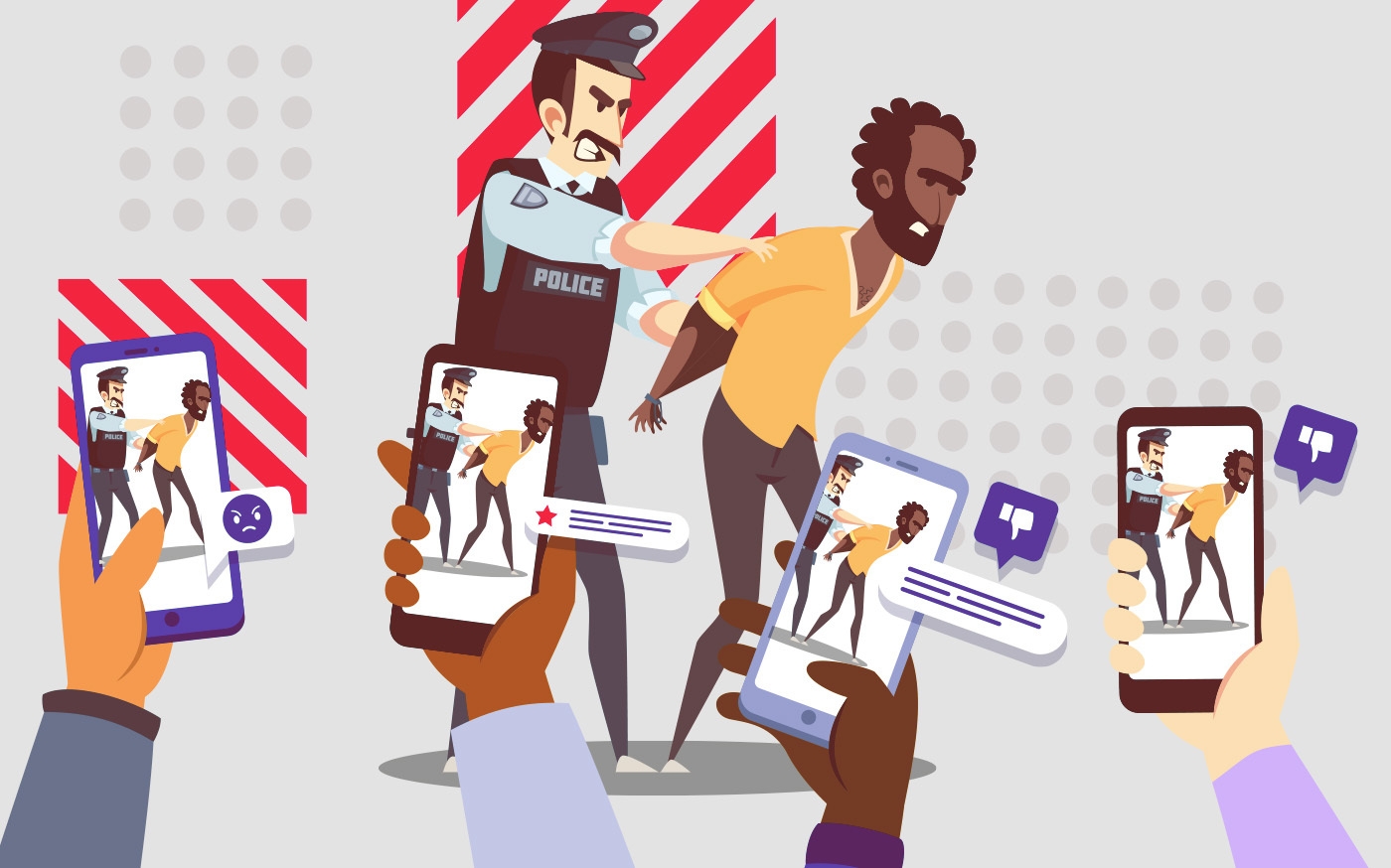
Essma Bengabsia was delivering groceries to low-income families across Jersey City on Sunday when she saw a police car pull over a vehicle carrying four young Black men.
In the next few moments, the white police officers pulled the men, who she describes as teenagers, out of the car and pushed them to the ground.
An older Black man driving in front of Bengabsia stopped his vehicle and began filming the incident. Bengabsia stopped her car, too, and joined.
Within a few minutes, around 10 people were filming as around a dozen police vehicles and 20 police officers arrived at the scene.
'If people don't see these images, it just becomes another death that becomes disputed with the police. No one would have known he had put his knee on [Floyd's] neck. It was hard to run away from that visual'
- Aisha al-Adawiya, community organiser
"All I could think is: I've been protesting this same damn thing this entire week; the whole country is up in flames about this, and it's still happening before my eyes," Bengabsia, who first shared her experience on Facebook, told Middle East Eye.
New MEE newsletter: Jerusalem Dispatch
Sign up to get the latest insights and analysis on Israel-Palestine, alongside Turkey Unpacked and other MEE newsletters
"I felt frustrated, infuriated, and extremely disappointed, though unsurprised," said the 22-year-old Tunisian-American and executive Director of The Muslim Network.
For 15 minutes, the police officers searched through the car as the men, now handcuffed, sat on the sidewalk.
The crowd that had gathered around the police refused to budge.
"We closely watched every move of those police officers. They felt the pressure, they called for backup, and they knew that they were going to be held accountable for any use of force or misconduct they were going to do," Bengabsia said.
The four men were finally released, but it is still not clear why they were stopped or handcuffed in the first place.
The office of the Mayor of Jersey City did not reply to MEE's request for clarification or comment.
Protests across the US
Tensions and emotions are still running high in the US following the murder of 46-year-old George Floyd by a white Minneapolis police officer on 25 May.
The quartet of police officers at the scene of the murder, including Derek Chauvin, who suffocated Floyd to death with his knee, has been fired and charged.
But protests against police brutality continue to grip cities and small towns across the US, in scenes some commentators say are unprecedented since the civil rights movement of the 1960s.
Cities like New York and Los Angeles were placed under curfew, helicopters circled over districts and troops were seen on the streets. Incidents of looting and violence became fodder by authorities to deploy the military and quash protests.
The incident in Jersey City came after a video showing police killing an unarmed Black man in May was released by New Jersey's attorney general. Maurice Gordon, a chemistry student and a driver for Uber Eats, was killed after a tussle following a routine traffic stop.
Activists in Jersey City have routinely accused the police department of exercising undue force and are still unsatisfied with the overtures made by the city's mayor since the protests began.
Calls to defund or abolish the police are growing across the country, with Minneapolis City Council already promising to dismantle the Minneapolis Police Department, and to create a new method of public safety.
US President Donald Trump is vehement in his opposition to defunding the police while the Democrats are talking about exerting oversight on the police; another word for reform.
"Some say that making such videos available educates people and helps convict police," Atiya Husain, an assistant professor at University of Richmond, told Middle East Eye.
"But at the same time we have calls for abolition of police and prisons, so putting police in prison is not the endgame for abolitionists," Husain said.
The dawn of the mobile phone camera may have altered the ways in which society and the police are monitored, but it's still not clear if the additional pressure exerted by bystanders armed with cameras is enough to deter the police from straying from its brutal character.
"There is a history of putting pressure on police when they're harassing Black people," Husain says.
"One of the co-founders of the Black Panther Party, Huey P. Newton, would read the law out loud to police and people would gather. This was a way of policing the police."
'Techno-utopian fantasy'
Recording the police is a right guaranteed by the US constitution, but those who have filmed the police have routinely complained of harassment and intimidation by authorities.
Even in the face of overwhelming footage, videos showing incidents of police brutality have almost always been dismissed for one reason or another, experts say.
Prosecutors and judges have a tendency of trusting the words of police officers over the evidence presented before them.
"The hope that pervasive cameras by themselves would counterbalance the systemic racism that leads to the over policing of communities of colour and the disproportionate use of force against Black men was simply a techno-utopian fantasy," Ethan Zuckerman wrote in the MIT Technology Review last week.
"If there's one thing that Americans - particularly people of colour in America - have learned from George Floyd, Philando Castile, and Eric Garner, it's that individuals armed with images are largely powerless to make systemic change," argued Zuckerman, who is an associate professor of public policy, communication, and information at the University of Massachusetts at Amherst.
George Floyd was seen suffocating and calling out for help on more than one camera, after all. Despite knowing the incident was being filmed, the police officer did not relent, and his fellow officers did not flinch at the brutality unspooling before their eyes. It was the video of Floyd's murder that crystallised an entire movement against racial injustice.
Aisha al-Adawiya, a long-time community organiser and scholarship officer at the Schomburg Center for Research in Black Culture, says that even if the gains are still small, she would encourage those who bear witness to police brutality to pull out their cameras and record the incident.
"We have to see it as a small crack in the glass. If people don't see these images, it just becomes another death that becomes disputed with the police. No one would have known [the police officer] had put his knee on [Floyd's] neck. It was hard to run away from that visual," Adawiya, told MEE.
But in the absence of substantive change, both Adawiya and Husain warn that continuously posting videos of Black people dying on camera risks normalising the perception of disposable Black life.
"There is a certain voyeurism that comes with watching these videos. And people can get desensitised. Also, we have have to think about the mental health of the family and those who are watching," Adawiya adds.
Likewise, Husain says that the goal "shouldn't be to capture Black death on camera for all to see; the goal is to stop it from happening by stopping those who are doing it".
Middle East Eye delivers independent and unrivalled coverage and analysis of the Middle East, North Africa and beyond. To learn more about republishing this content and the associated fees, please fill out this form. More about MEE can be found here.


